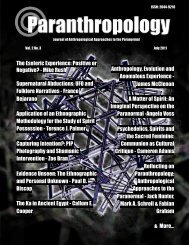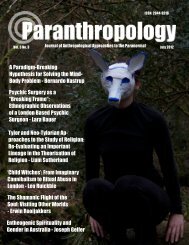Psi and Psychedelics - Paranthropology - Weebly
Psi and Psychedelics - Paranthropology - Weebly
Psi and Psychedelics - Paranthropology - Weebly
Create successful ePaper yourself
Turn your PDF publications into a flip-book with our unique Google optimized e-Paper software.
PARANTHROPOLOGY: JOURNAL OF ANTHROPOLOGICAL APPROACHES TO THE PARANORMAL VOL. 2 NO. 2<br />
In Memory of Stan Gooch<br />
(1932-2010)<br />
Robert M. Schoch & Oana R. Ghiocel<br />
Stan Gooch passed away on 13 September 2010<br />
in a Swansea (South Wales) hospital at the age of<br />
seventy-eight. Born in London to working-class<br />
parents, <strong>and</strong> spending most of his days in<br />
Engl<strong>and</strong> <strong>and</strong> Wales (although at one point he<br />
traveled to the Middle East for several months),<br />
on the surface Gooch’s life may not seem<br />
particularly exciting. It was his remarkable<br />
intellectual journeys that distinguished him as a<br />
person <strong>and</strong> wherein lies his legacy. In relative<br />
isolation Gooch studied the elements of human<br />
personality, the conscious <strong>and</strong> unconscious mind,<br />
paranormal phenomena, the mental/psychical life<br />
of Ne<strong>and</strong>erthals, <strong>and</strong> the impact of Ne<strong>and</strong>erthal<br />
culture, beliefs, <strong>and</strong> biology on modern humans<br />
(Gooch firmly believed that modern human<br />
ancestors, Cro-Magnons, interbred with<br />
Ne<strong>and</strong>erthals). He authored many books,<br />
including Total Man (1972), Personality <strong>and</strong><br />
Evolution (1973), The Ne<strong>and</strong>erthal Question<br />
(1977), The Paranormal (1978), Guardians of<br />
the Ancient Wisdom (1979), The Double Helix of<br />
the Mind (1980), Creatures from Inner Space<br />
(1984), <strong>and</strong> Cities of Dreams (1989). However,<br />
Gooch never gained the popular audience,<br />
critical acclaim, or monetary remuneration that<br />
he had hoped for. Indeed, Gooch became<br />
convinced that the establishment was<br />
deliberately ignoring him <strong>and</strong>, as he stated in one<br />
interview, somehow the scriptwriter of life had<br />
not written into Gooch’s life either wide<br />
recognition or financial success. By the late<br />
1980s he had all but given up his studies <strong>and</strong><br />
writing, <strong>and</strong> went into seclusion, only to<br />
reemerge with one last book, The Ne<strong>and</strong>erthal<br />
Legacy, published just two years before his death<br />
(primarily a short summary of his earlier works).<br />
In the end, Gooch did entertain the thought that,<br />
just perhaps, after his death his contributions<br />
might be widely acknowledged. This may still<br />
prove to be the case.<br />
Gooch’s lifework defied the conventional<br />
categories of his time, <strong>and</strong> even ours today. It did<br />
not easily <strong>and</strong> neatly fit into any of the accepted<br />
academic disciplines. He was trained as a<br />
psychologist; but he had a strong interest in the<br />
paranormal, which he accepted as having a<br />
genuine basis, a stance frowned upon by most of<br />
his fellow psychologists. Yet Gooch was not a<br />
classical parapsychologist either, <strong>and</strong> he<br />
disdained many of the, to his mind, boring <strong>and</strong><br />
unrealistic (divorced from a meaningful<br />
emotional <strong>and</strong> cultural context) laboratory<br />
experiments as espoused by the likes of J. B.<br />
Rhine <strong>and</strong> the experimental parapsychologists<br />
(see Schoch <strong>and</strong> Yonavjak, 2008). Gooch was an<br />
experienced trance medium in the classic séance<br />
sense, <strong>and</strong> he had many personal paranormal<br />
experiences to draw upon as he developed his<br />
theories. In some ways, Gooch was more of an<br />
anthropologist <strong>and</strong> ethnographer than a<br />
psychologist or parapsychologist, but rather than<br />
study exotic or traditional societies deep in the<br />
heart of Africa, in the jungles of the Amazon, in<br />
Central Asia, or in the outer reaches of the Far<br />
East, he focused on two cultures: 1) that of his<br />
contemporary British society, <strong>and</strong> 2) that of the<br />
ancient Ne<strong>and</strong>erthals.<br />
The full range of paranormal experiences<br />
—a partial list includes poltergeists hauntings,<br />
visitations by incubi <strong>and</strong> succubi, demons,<br />
stigmata, telepathy, mediumship, spontaneous<br />
human combustion <strong>and</strong> paranormal fire, psychic<br />
healing, alleged past lives, hypnosis, <strong>and</strong><br />
multiple personalities—constituted the material<br />
Gooch explored. He had a keen <strong>and</strong> critical<br />
mind; while he was meticulous <strong>and</strong> unrelenting<br />
when it came to detecting <strong>and</strong> exposing fraud, he<br />
was always careful to follow the narrow path<br />
between blanket skepticism <strong>and</strong> dismissal of real<br />
phenomena on the one h<strong>and</strong> <strong>and</strong> naiveté <strong>and</strong><br />
gullibility on the other h<strong>and</strong>. He inveighed<br />
against throwing out the baby with the bathwater,<br />
<strong>and</strong> he soundly criticized the academics <strong>and</strong><br />
scientists who refuse to acknowledge the<br />
overwhelming evidence for paranormal<br />
phenomena. Although he trained as a medium,<br />
Gooch rejected the concept of discarnate entities,<br />
ghosts, spirits, elementals, <strong>and</strong> the like as<br />
separate <strong>and</strong> distinct beings unto themselves. He<br />
did not view paranormal phenomena as<br />
49 PARANTHROPOLOGY: JOURNAL OF ANTHROPOLOGICAL APPROACHES TO THE PARANORMAL




